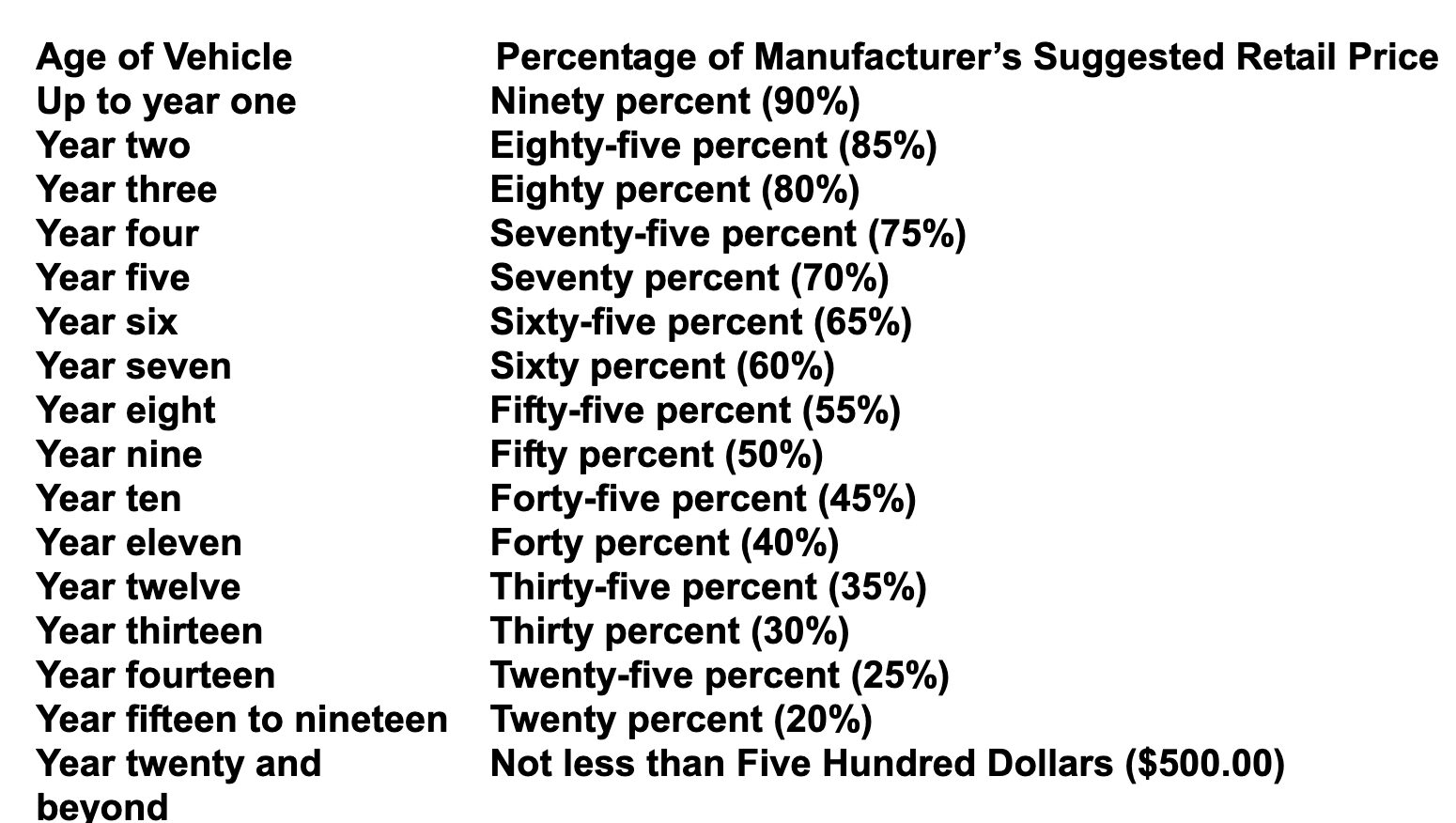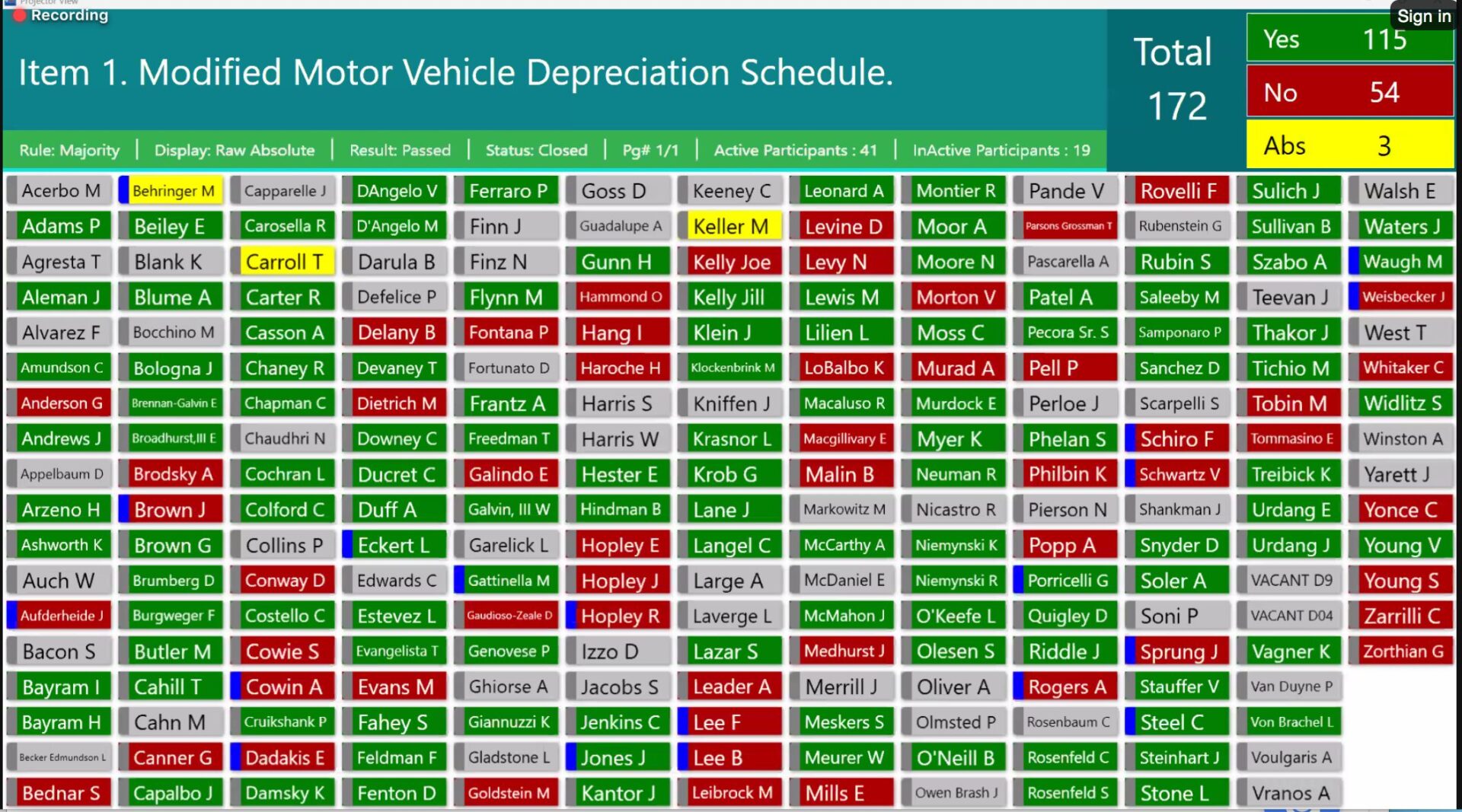The 230-member Greenwich Representative Town Meeting held a special meeting Monday night to consider adopting a proposed modified schedule of depreciation for motor vehicles for purposes of property taxation.
House Bill No. 7067 included a provision to create a new schedule for car tax in Connecticut. Local legislative bodies – Greenwich’s legislative body is the RTM – were directed to make the determination.
Typically a decision like the one Monday night would go first to BET and then RTM. But this motor vehicle tax schedule question stemmed from the new state statute.
Three committees took the item up last week: Budget Overview Committee, Legislative and Rules, and Finance committees. All three committees were favorable to the modified schedule.
BET chair Harry Fisher said the BET was neutral on the question.
While other towns in Connecticut rely heavily on motor vehicle taxes in their grand list, Greenwich’s grand list is very large which allows the town to set its mill rate low. And while the major driver of the grand list is real estate property, motor vehicles also make up part of it.
Until recently, assessors like Greenwich’s Lauren Elliott, used a “schedule of values” created by the state Office of Policy and Management to determine motor vehicle taxes. That schedule was based on average retail price.
Usually, the OPM used the National Automobile Dealers Association’s annual appraisal guide, similar to Kelley Blue Book, where people could look up the value of a used car if they traded it in or sold to another person.
Percentage of MSRP, the original “sticker price,” is usually lower than the resale value, so regardless of the RTM vote, all motor vehicle owners will get a break on their car taxes.
The new state legislation allows towns to adopt a modified depreciation schedule starting at 90% of MSRP instead of 85% MSRP on a one year old car. (See deep fall schedule below). When a car is 20 years old, the tax bill is based on 20% of the car’s value or $500, whichever is greater.

Potential $1 million gap in revenue for Greenwich
For some, the elephant in the room was the school budget where there is a $4 million shortfall based on the BET guidelines.
But that was an entirely separate issue as Mary Flynn was told by the moderator Alexis Voulgaris after Flynn said, “I’ve been told that if we don’t pass this, it’s likely the BET will cut the million from the school budget.”
“I would caution you, I think that is speculation. I have not heard the motor vehicle tax, if not approved, is going to be cutting education,” Voulgaris said.
“I’m going to say vote yes because I don’t want the budget cut,” Flynn said.
Aaron Leonard from district 12 spoke in favor of the proposal.
“The issue is, it will result in a reduction of income to the town that previously came from a higher tax rate on the property that is motor vehicles. Regardless of the way you vote, that amount will be reduced here in Greenwich. The choice is between a reduction and a slightly smaller reduction of about a million dollars.”
Greg Zorthian, chair of the finance committee, said initially he favored the proposal but had changed his mind based on input, in part from Ed Dadakis.
In an email to the RTM, Mr. Dadakis wrote that he planned to vote no based on fairness. He said Kelley Blue Book was probably the premier organization which estimates used car prices in America.
“And I should point out that Kelley Blue Book numbers are based off what you actually pay for the car, not the MSRP which is what the town is imposing. I think everyone knows most people pay less than MSRP for their cars except the most in-demand ones.”
“In my opinion, it is totally inappropriate that the Town raise the assessed values on automobiles simply because they need the money,” he added. “I bet you are like me. When you get the assessed value on your home, you immediately calculate the market value. If it isn’t correct you appeal it to the board of assessment appeals. People will not have that opportunity on their automobiles and the Town is purposely over assessing them.”
Jane Sprung also wrote to the RTM urging a no vote, saying, “We are facing potential an unprecedented increase in our local taxes and the cost of living is not declining. There are hardworking residents in town whose main assets are their cars. Residents who own cars are finally getting a break in their taxes with Hartford’s new law. Let’s not increase their burden.”
Keith Damsky from district 2 spoke in favor of the proposal. “There are those who say there is no time between this and the school budget, that’s true, they are two different things, but they are all part of the budget. We all want to come to a fiscally responsible answer.”
“What we have here is a mitigation of a reduction of the grand list. It may be fiscally prudent not to reduce it drastically in a time where we have constraints on our resources,” Damsky said. “We can have a nice comfortable mill rate by saying yes to this.”
James Waters, chair of the BOC gave some context.
“During Covid when the price of cars went up, this led to a spike in motor vehicle taxes. In response, the state legislature passed a new law changing the assessment of vehicles to be based on MSRP, with a default 20 year depreciation schedule applied.”
“This revised methodology will meaningfully reduce motor vehicle tax revenue across the state. For Greenwich this will reduce the motor vehicle grand list by $114 million, approximately 10.76% less than last year. As a result, all residents will receive a significant reduction in motor vehicle taxes versus what they paid in previous years.”
He said the primary beneficiaries of the state’s change are collectible car owners who will see an outsize reduction in motor vehicle taxes.
“If this modified deprecation schedule passes the RTM, the town’s motor vehicle grand list will be reduced by $32 million, versus last year – approx 3% less. This will result in incremental tax revenues for the town of approx $1 million than if we do not adopt the modified depreciation schedule.”
“If the RTM votes yes, residents will receive slightly less reduction in motor vehicle taxes and the town will gain approximately $1 million in tax revenue. This will put less pressure on increasing the mill rate or cutting spending,” Waters said.
“If the RTM votes no, residents will receive a greater decrease in their motor vehicle taxes, and the town will lose approximately $1 million in tax revenue which will put more pressure on increasing the mill rate or cutting spending.”

The vote was 115 to 51 in favor (3 abstained) of calculating at the higher percentage.
After the meeting, Mr. Waters said, “This was a good outcome for everyone: Residents will see a meaningful reduction in their motor vehicle taxes this year and the RTM’s action helps bolster the Grand List, relieving upward pressure on the mill rate and protecting important services the town provides to its residents.”